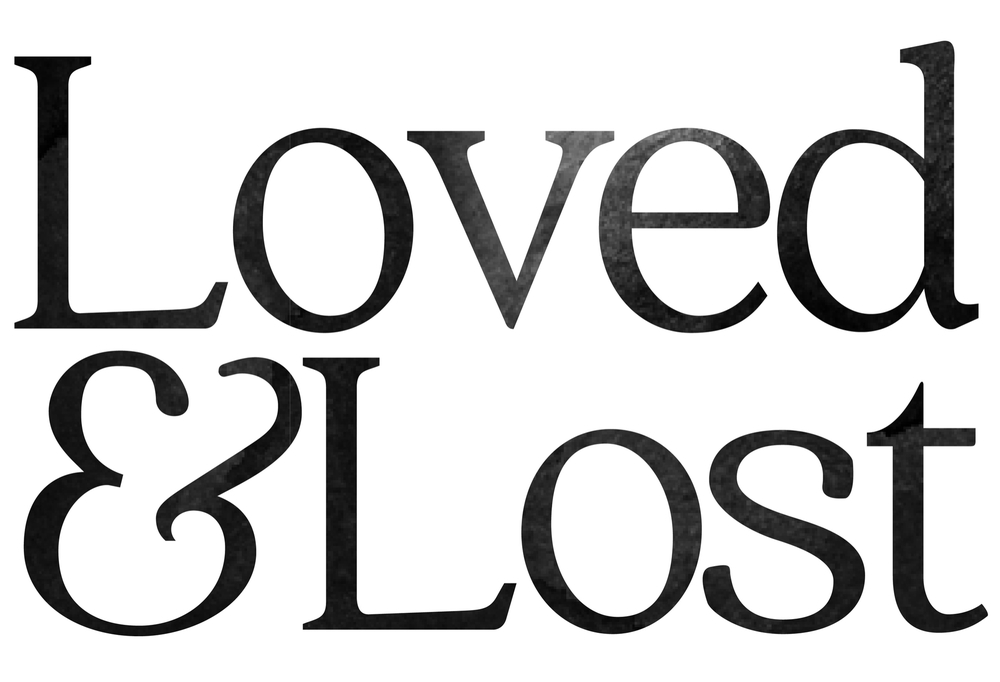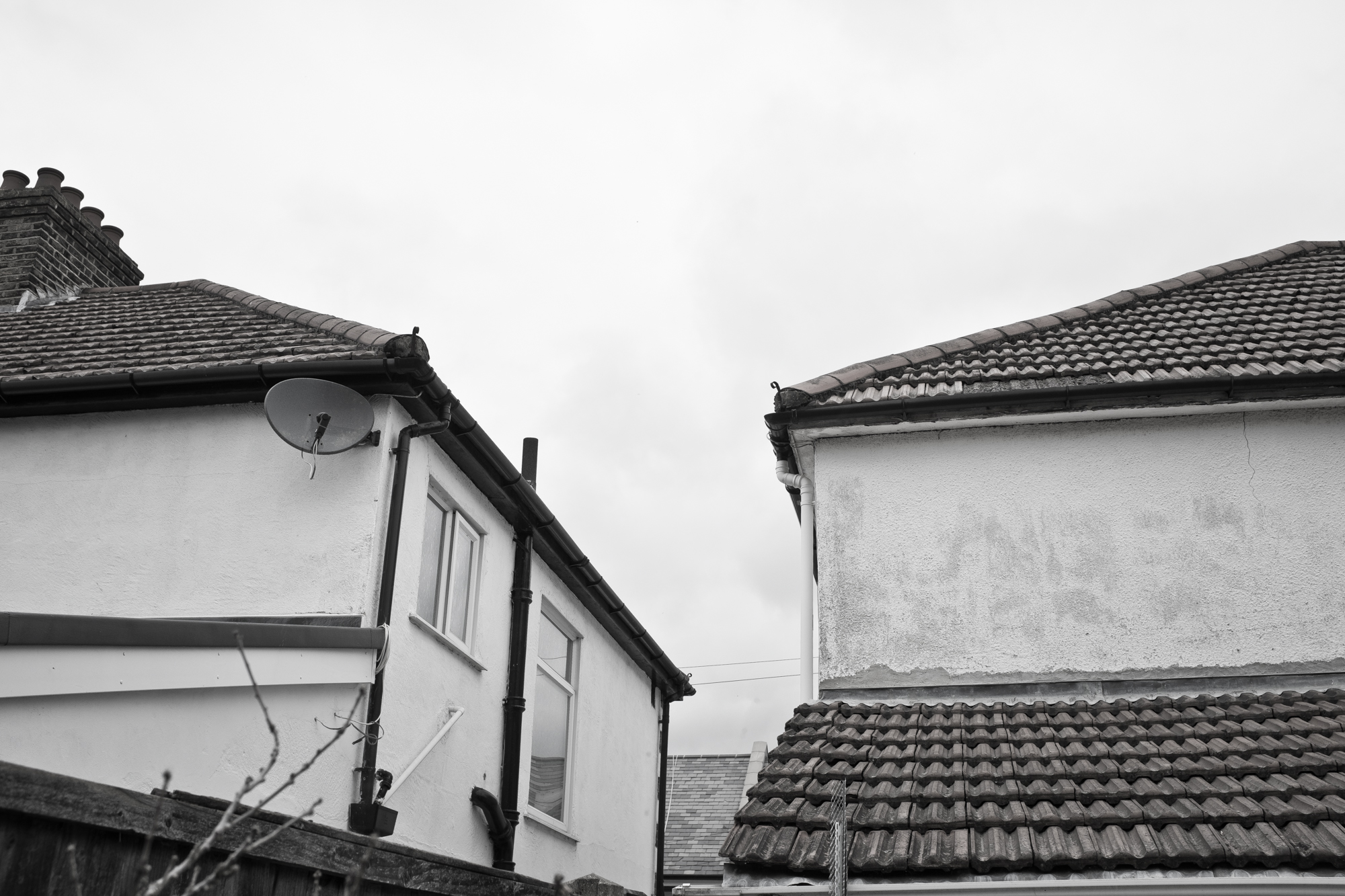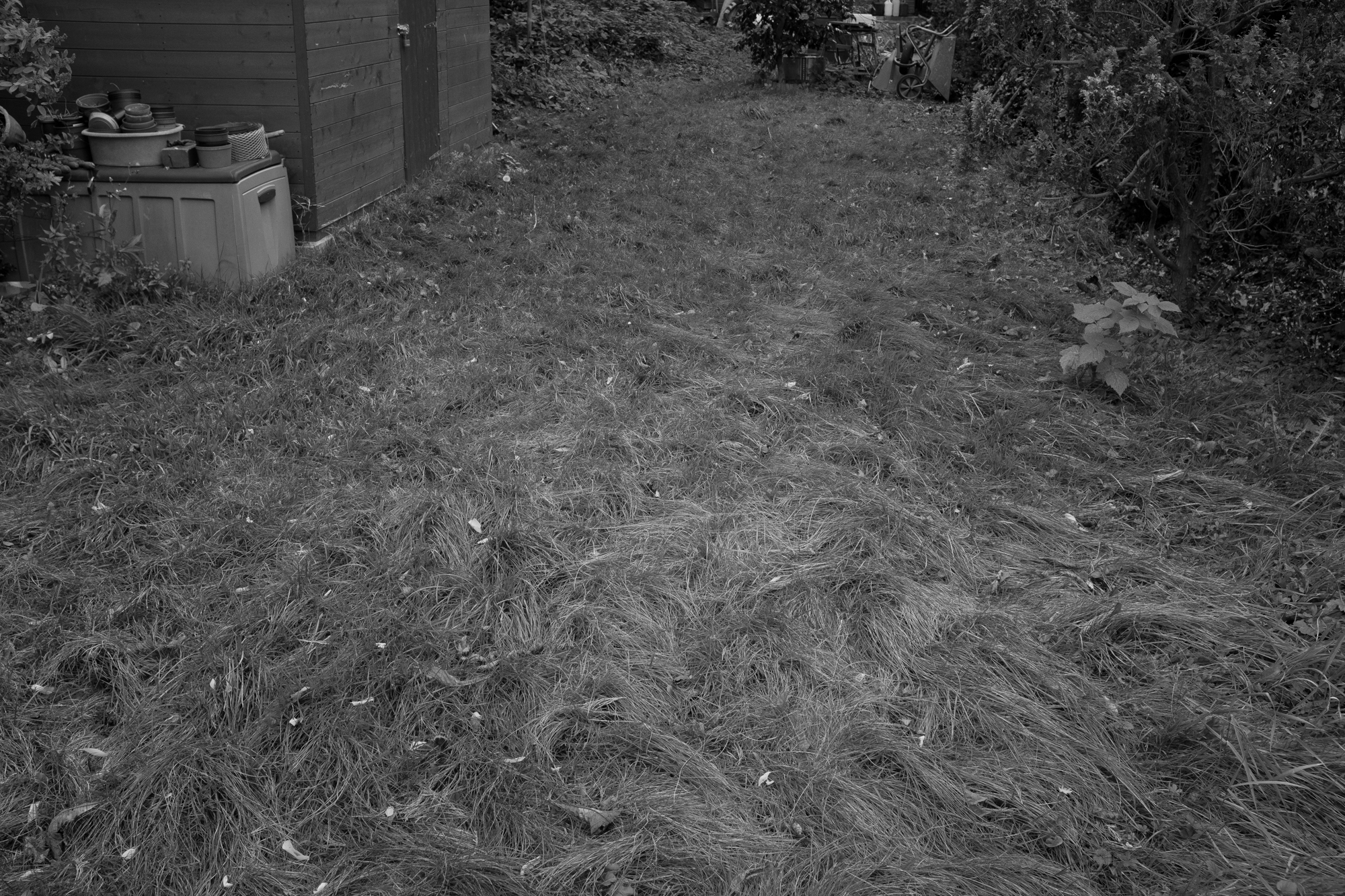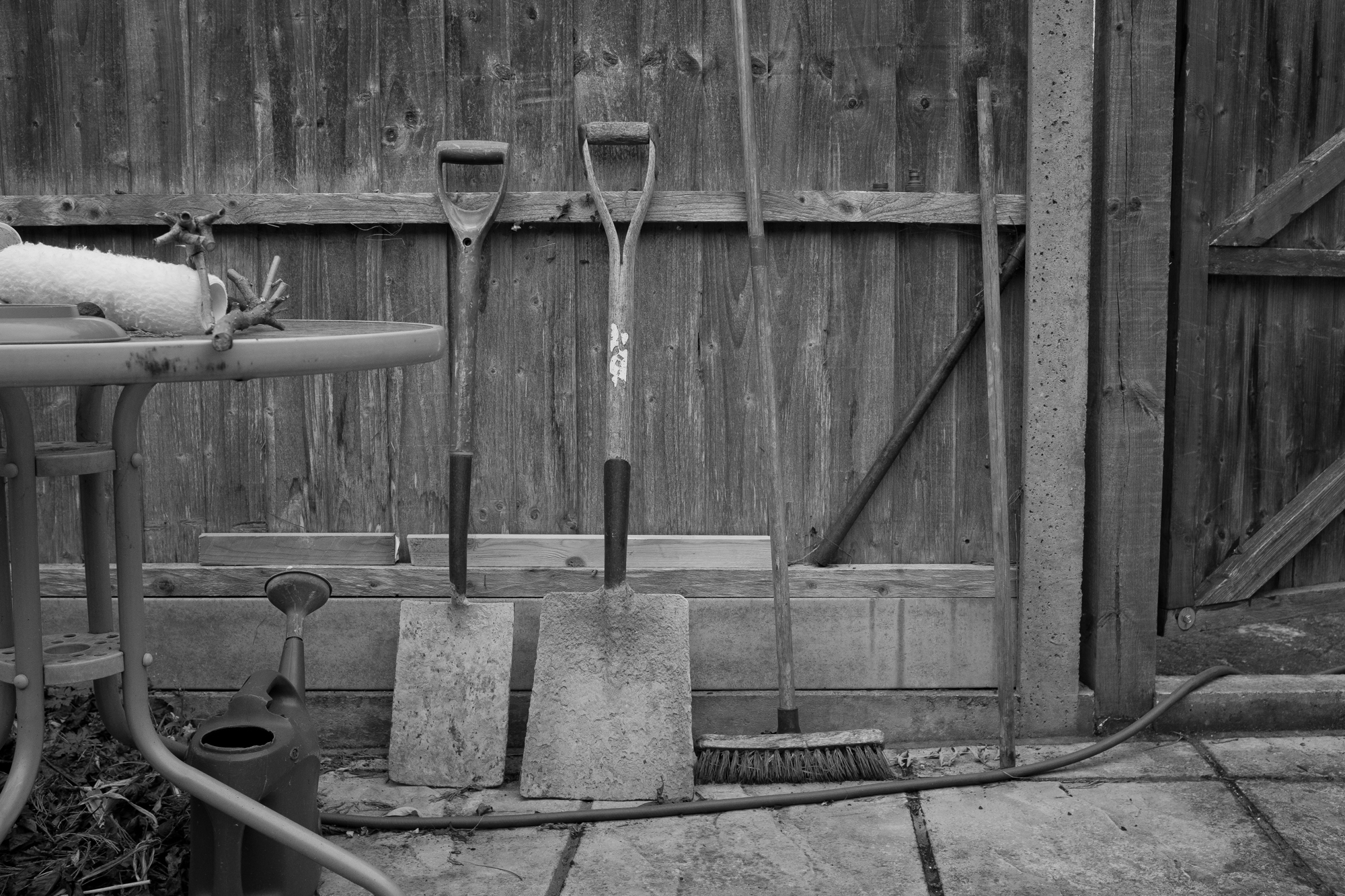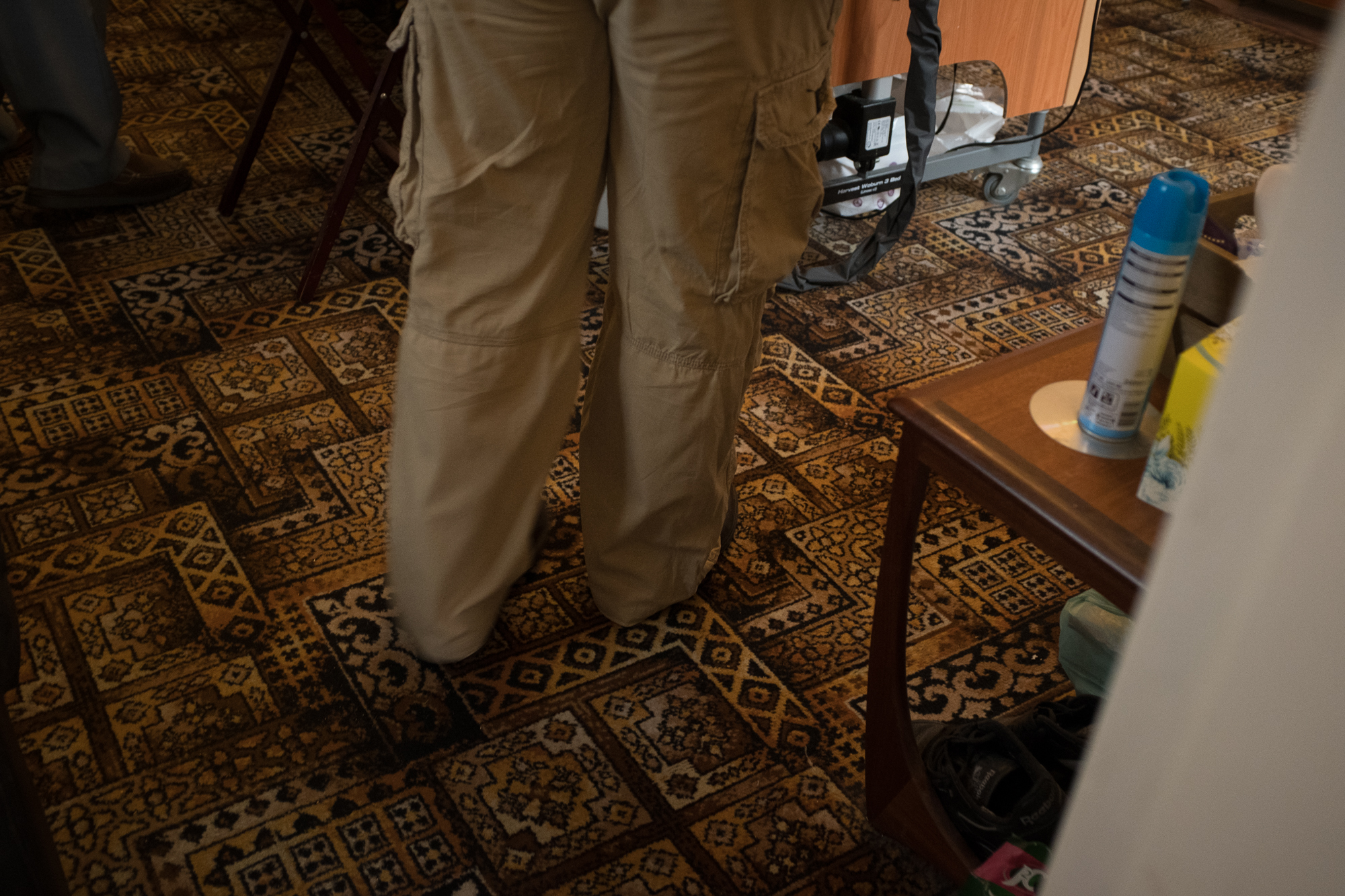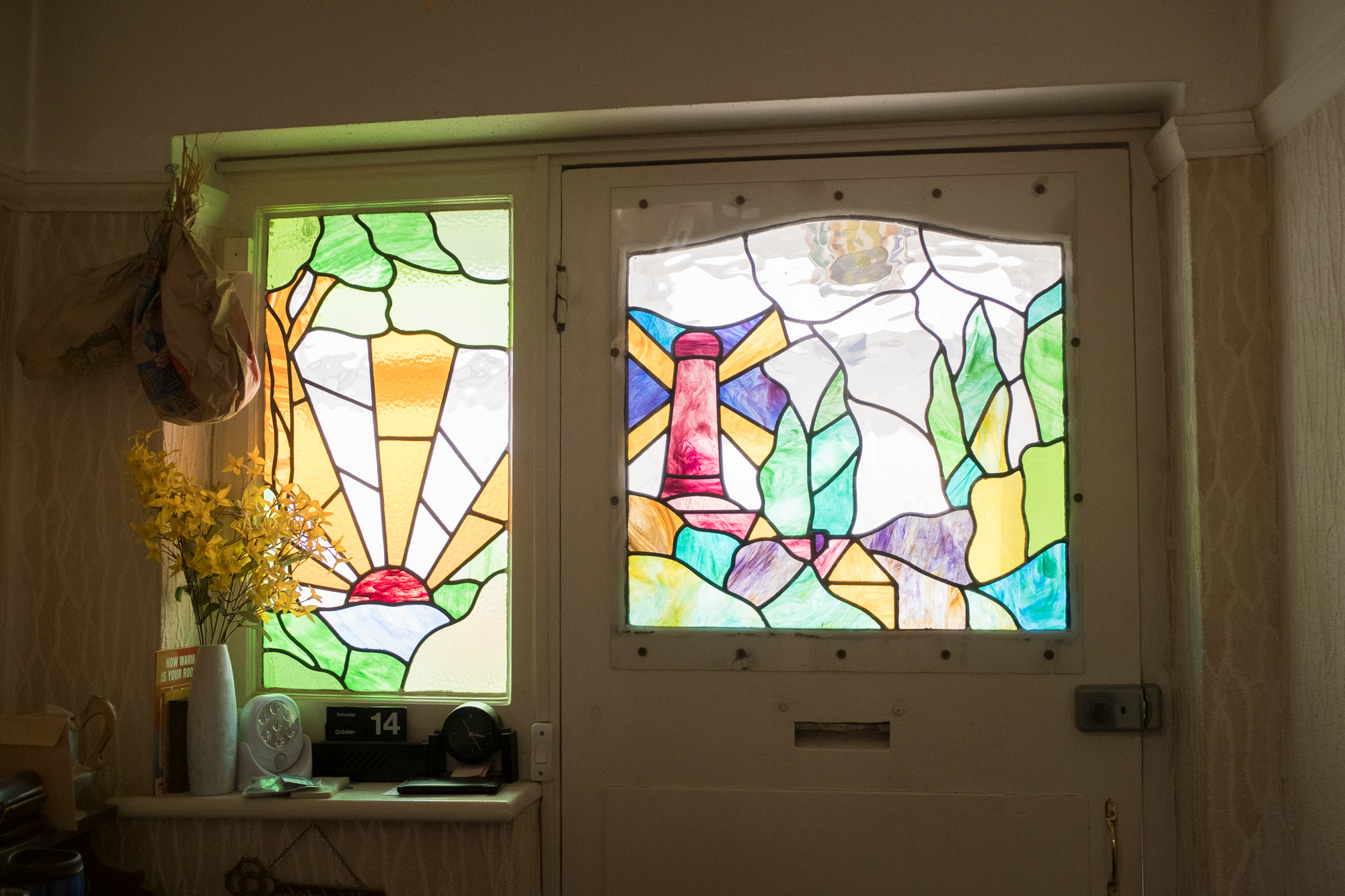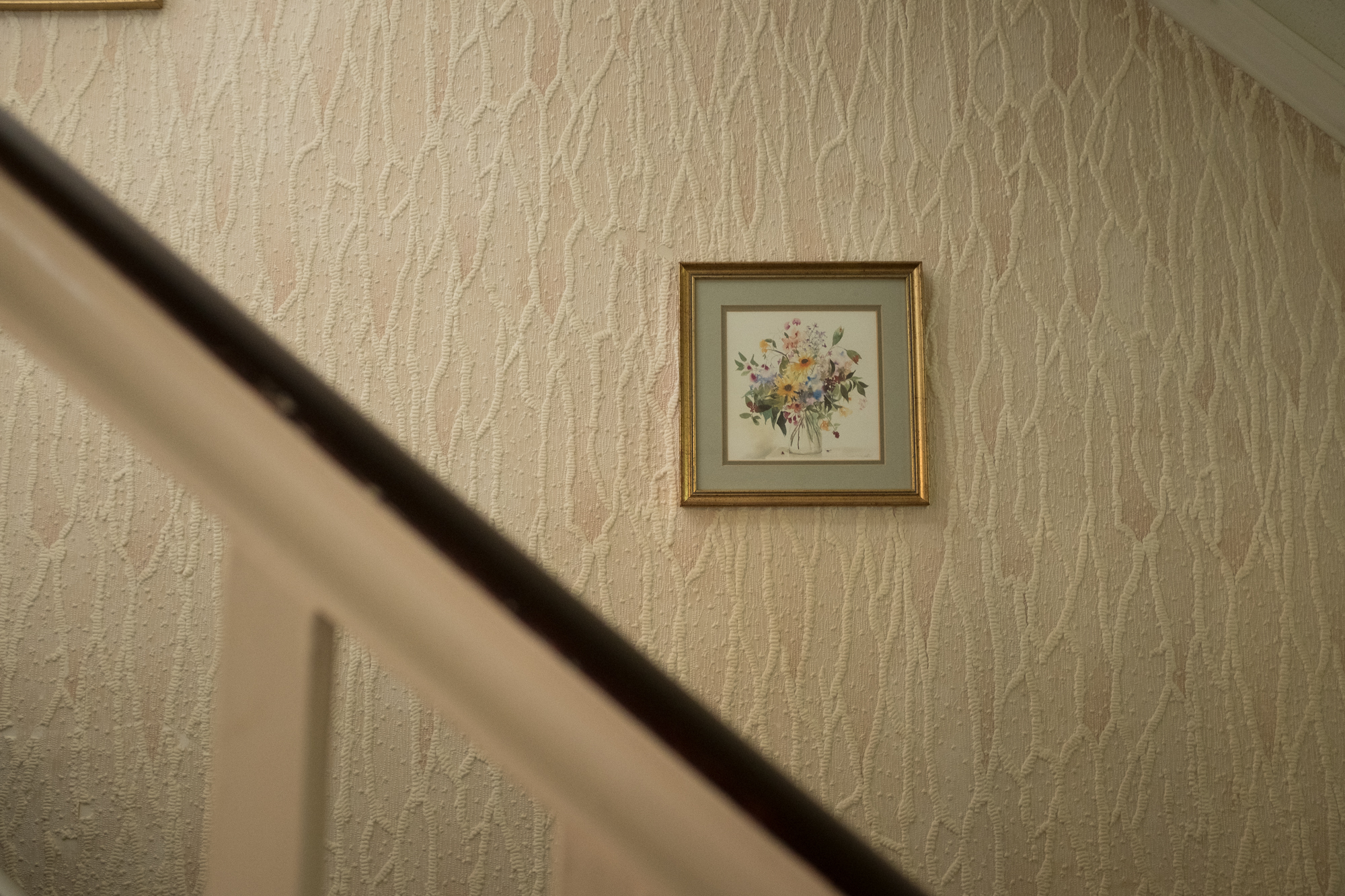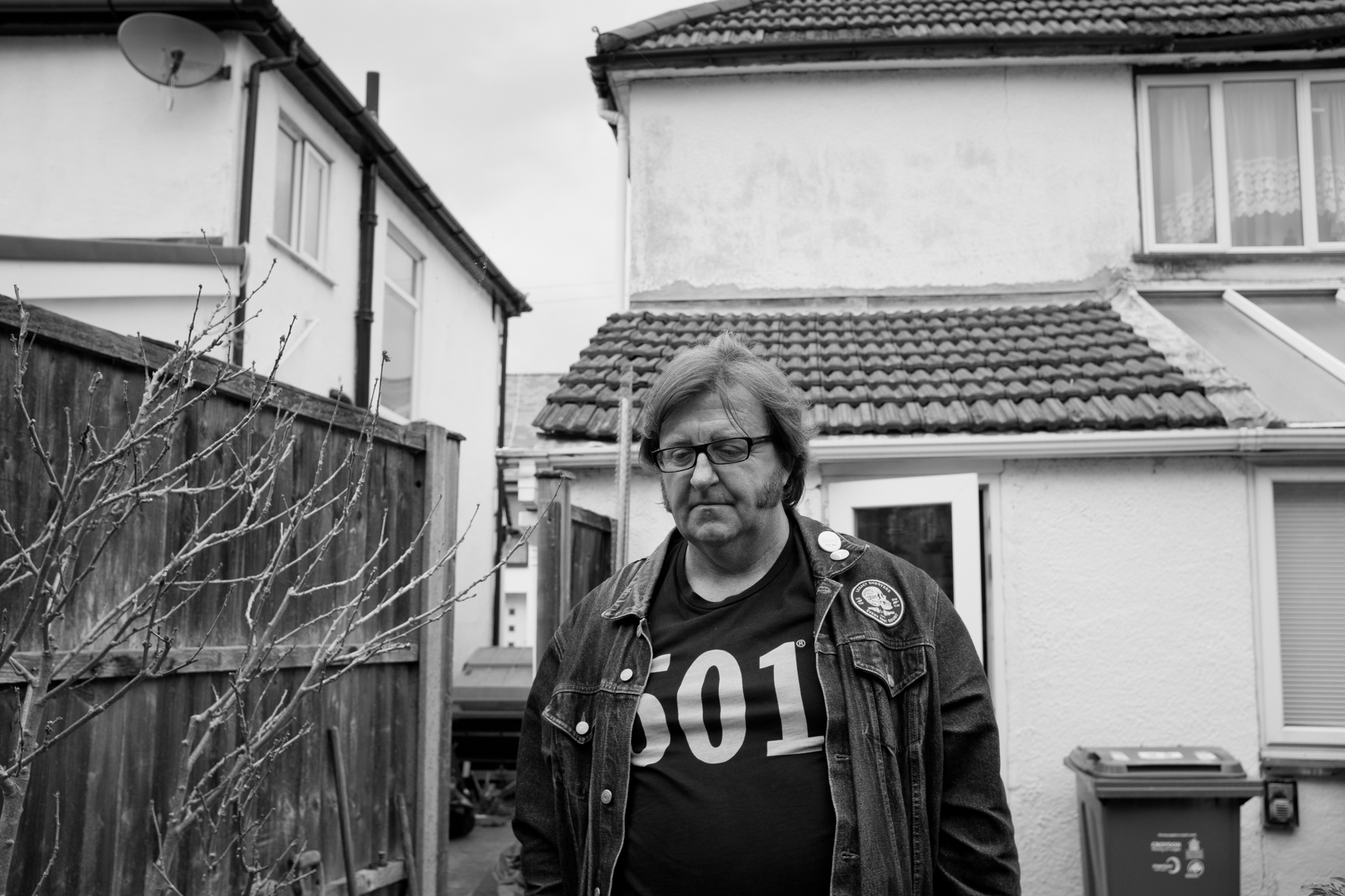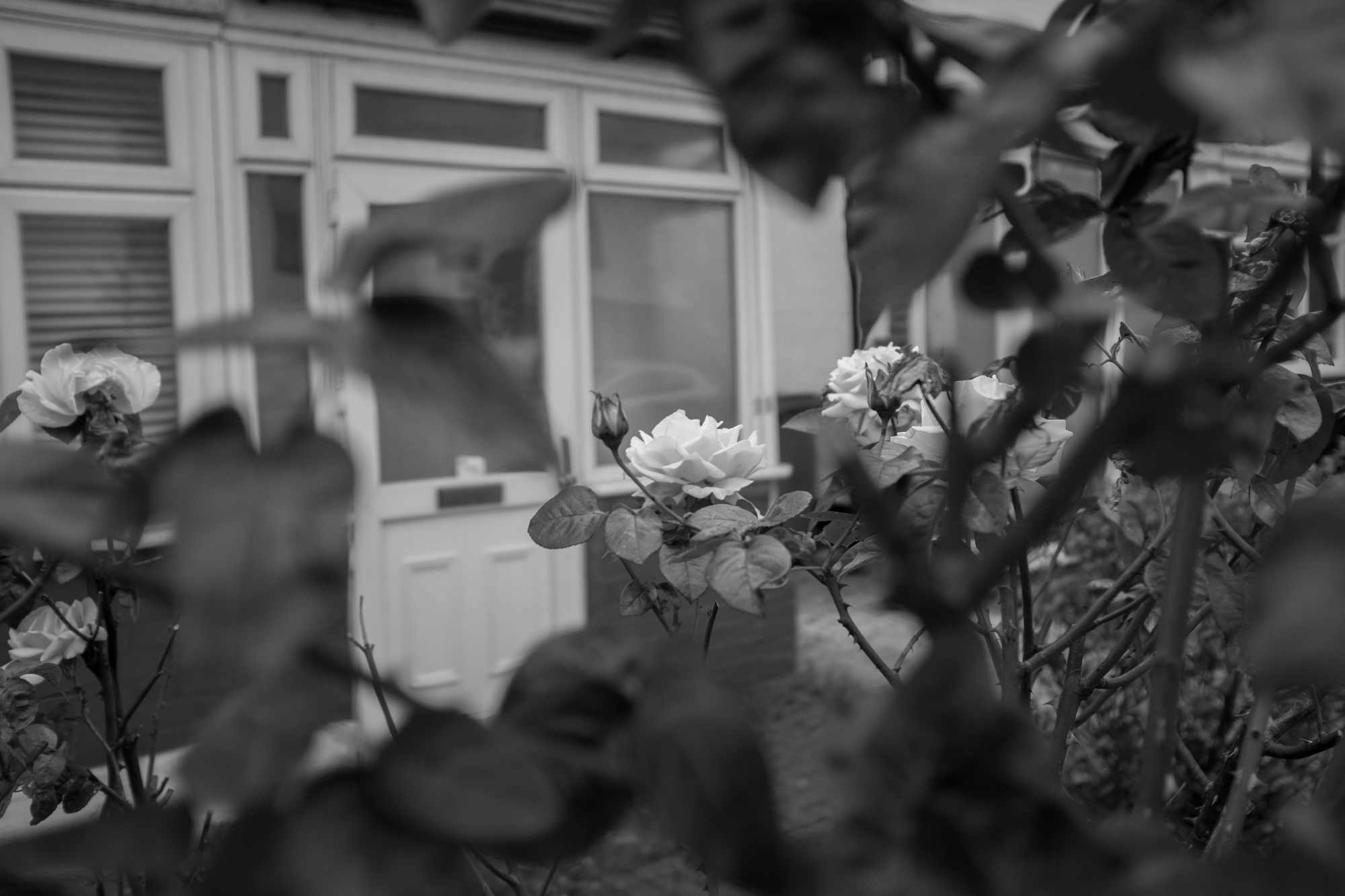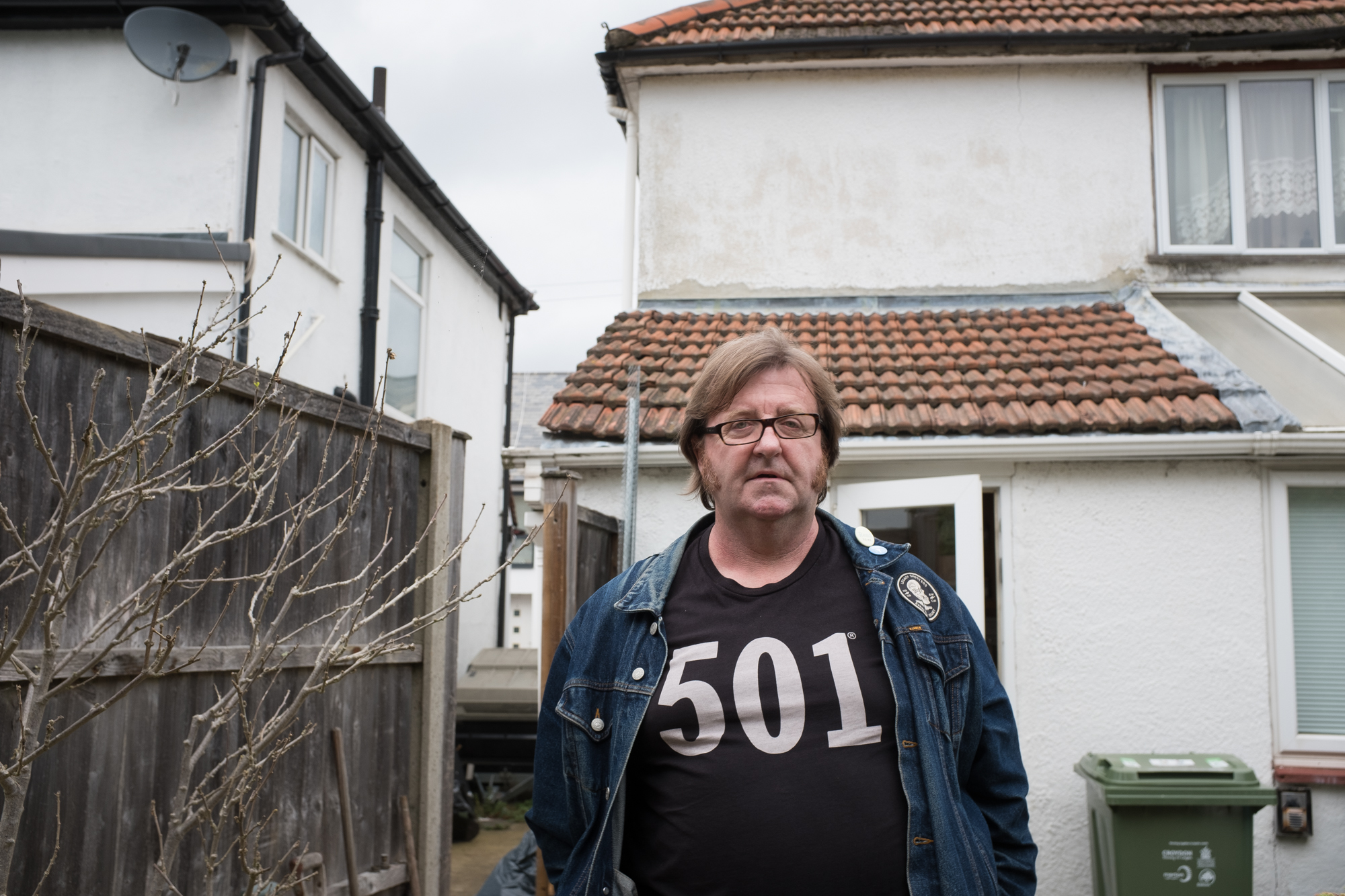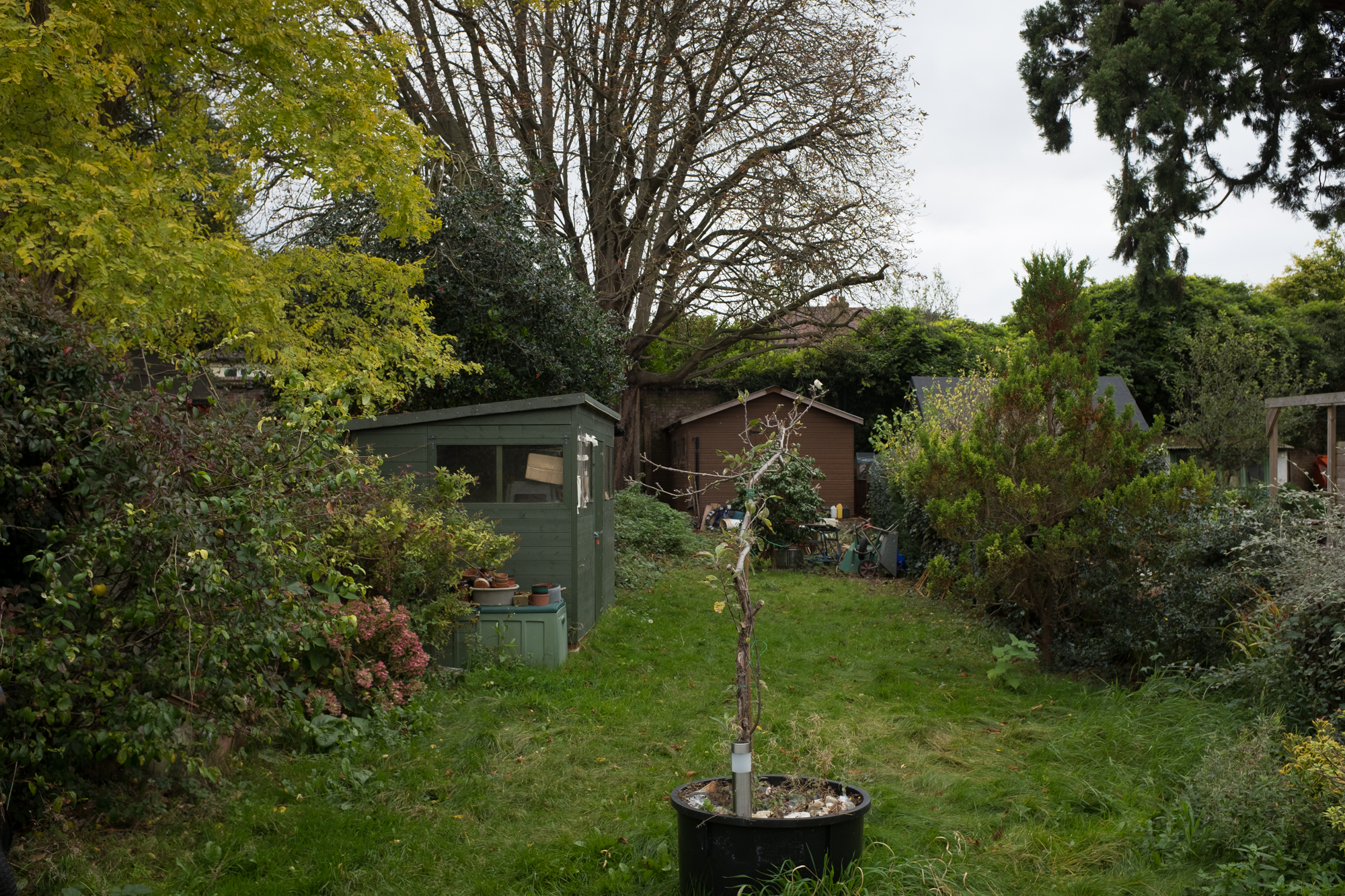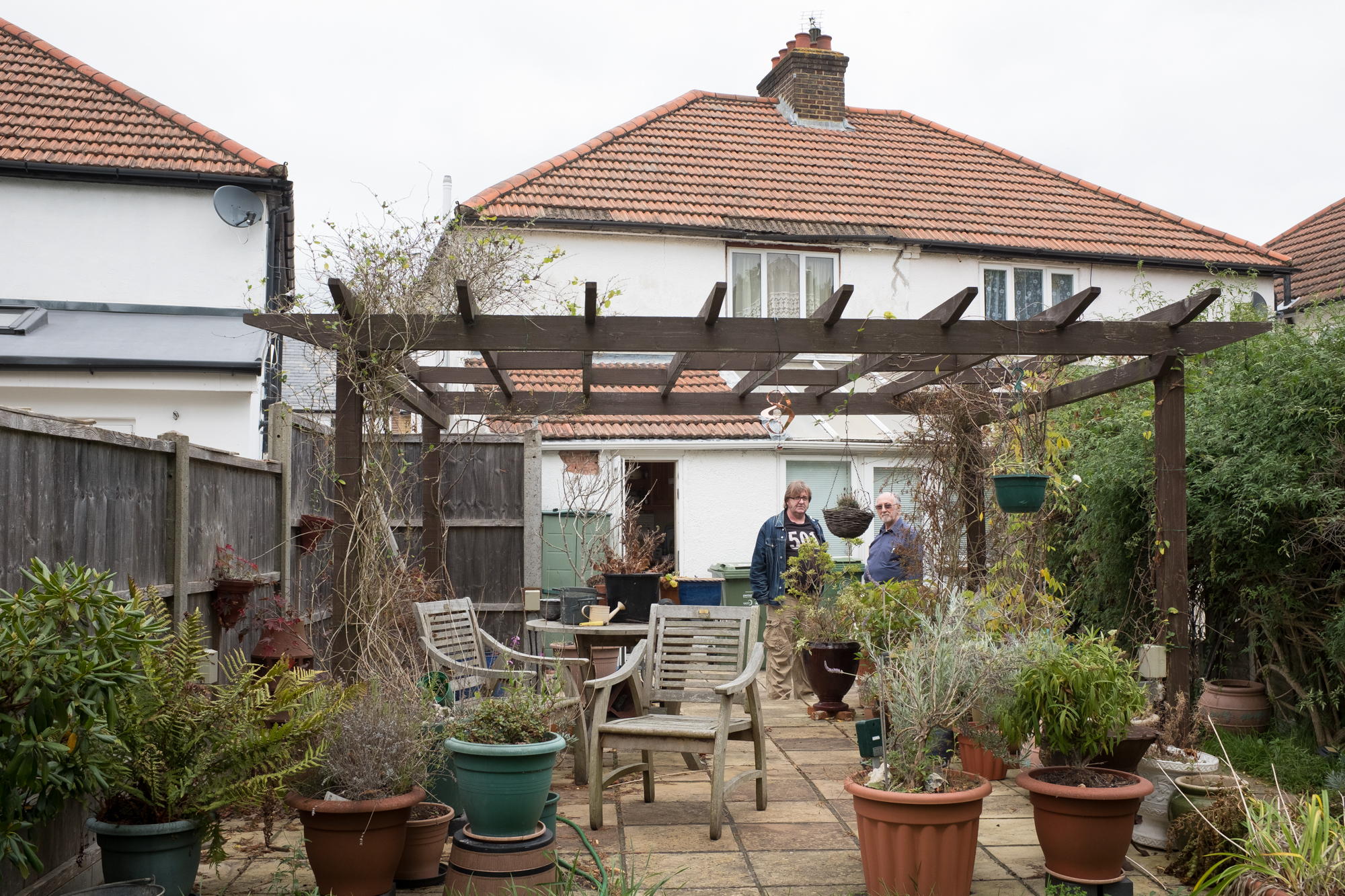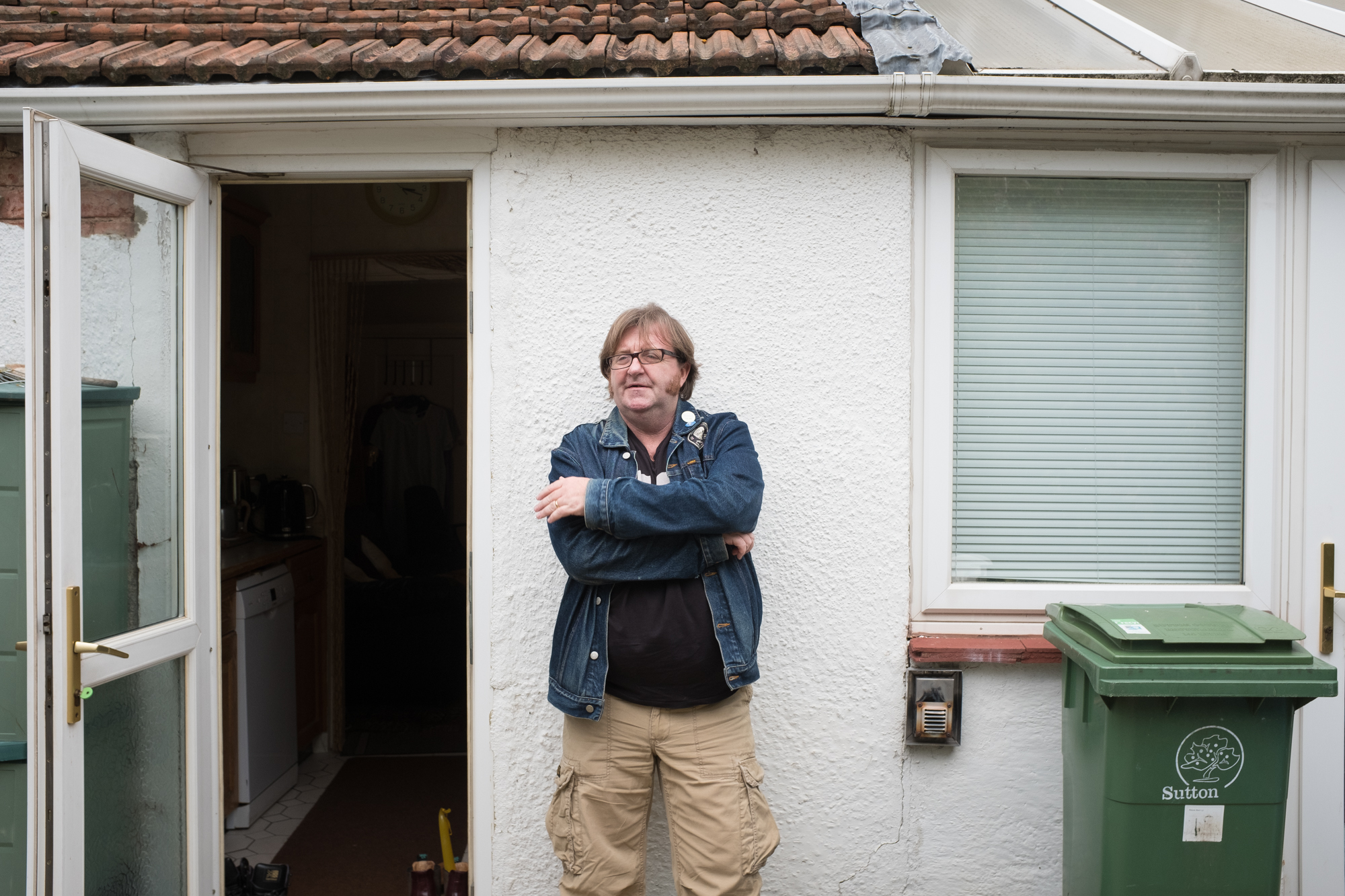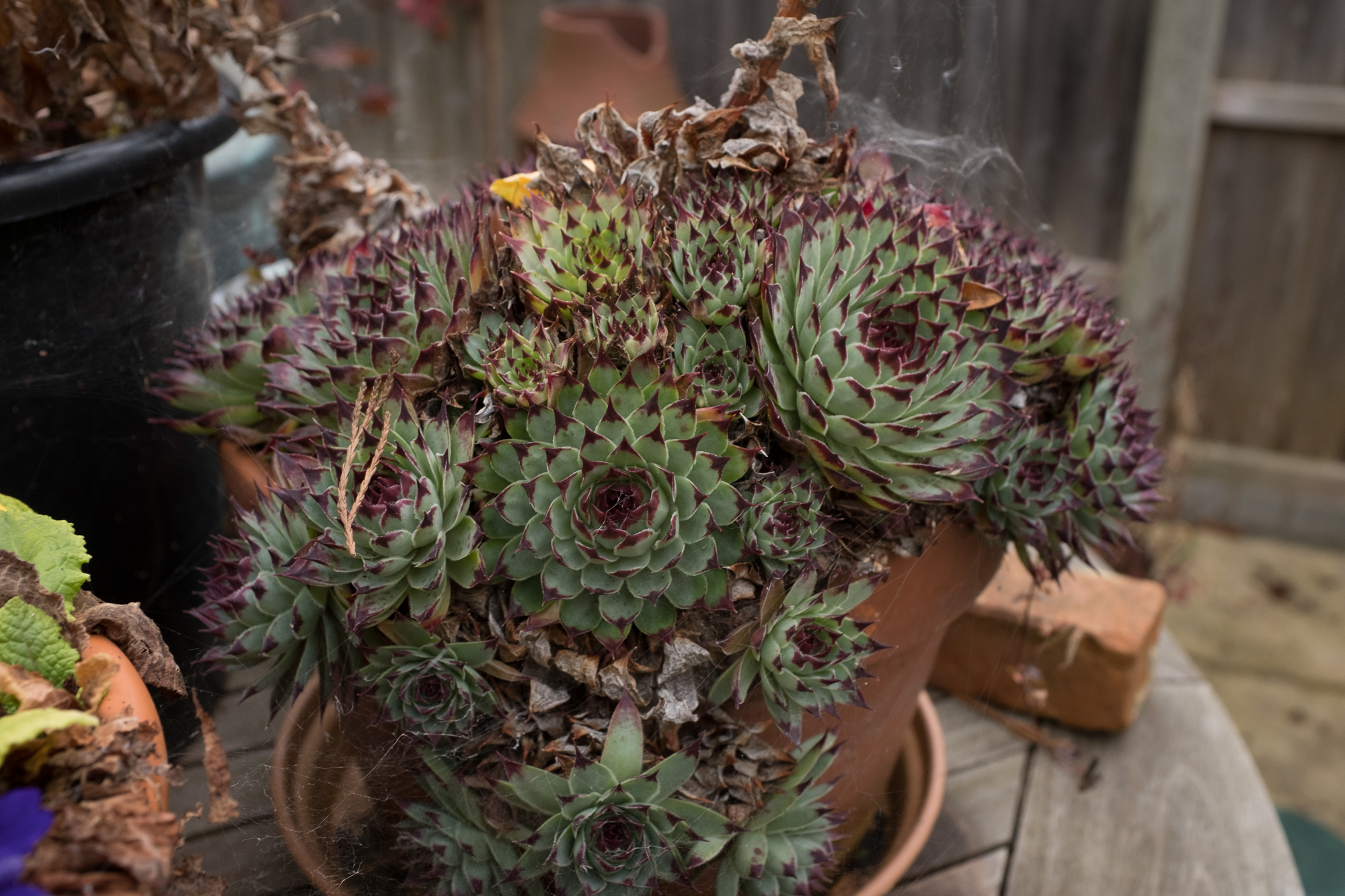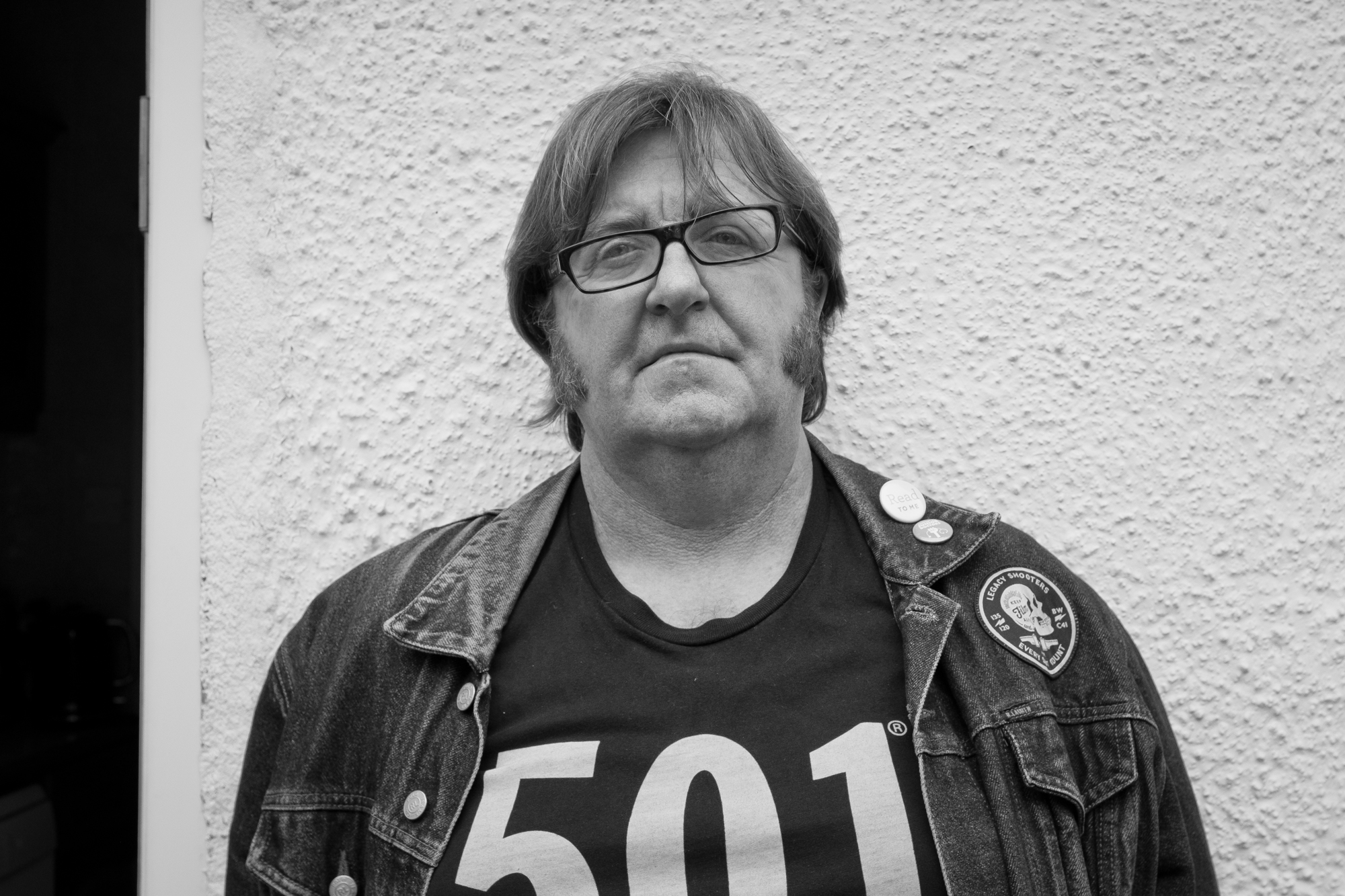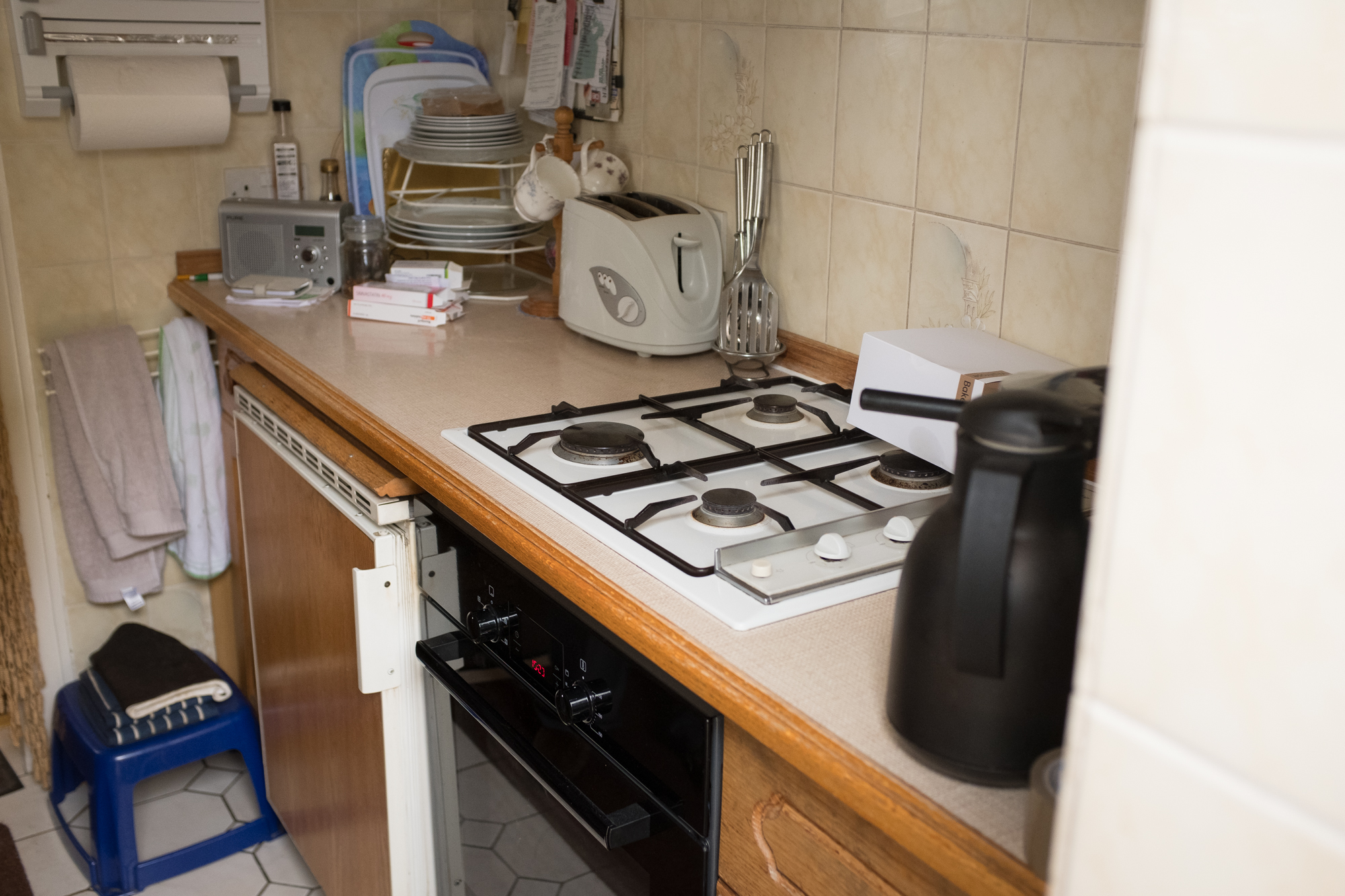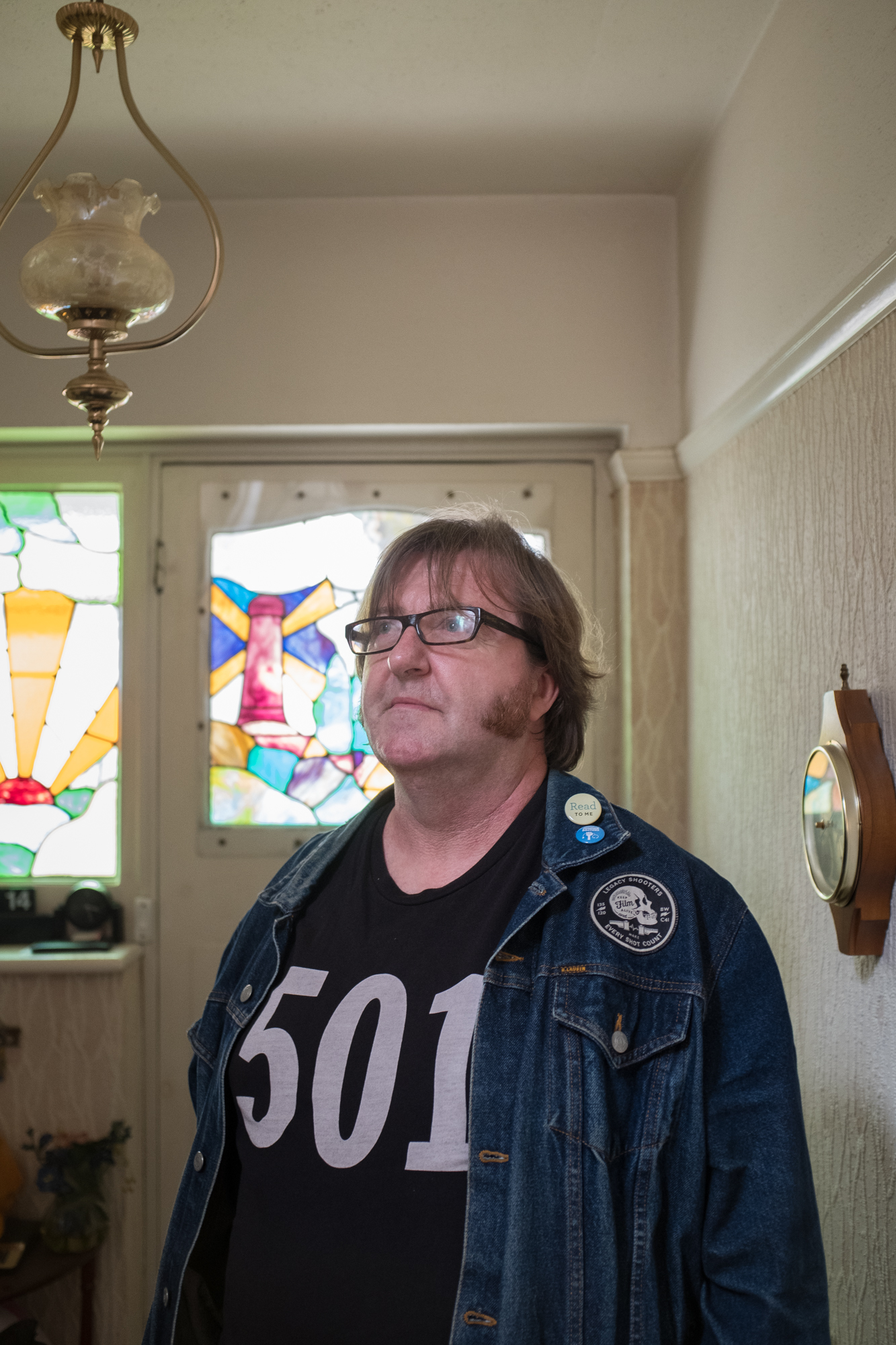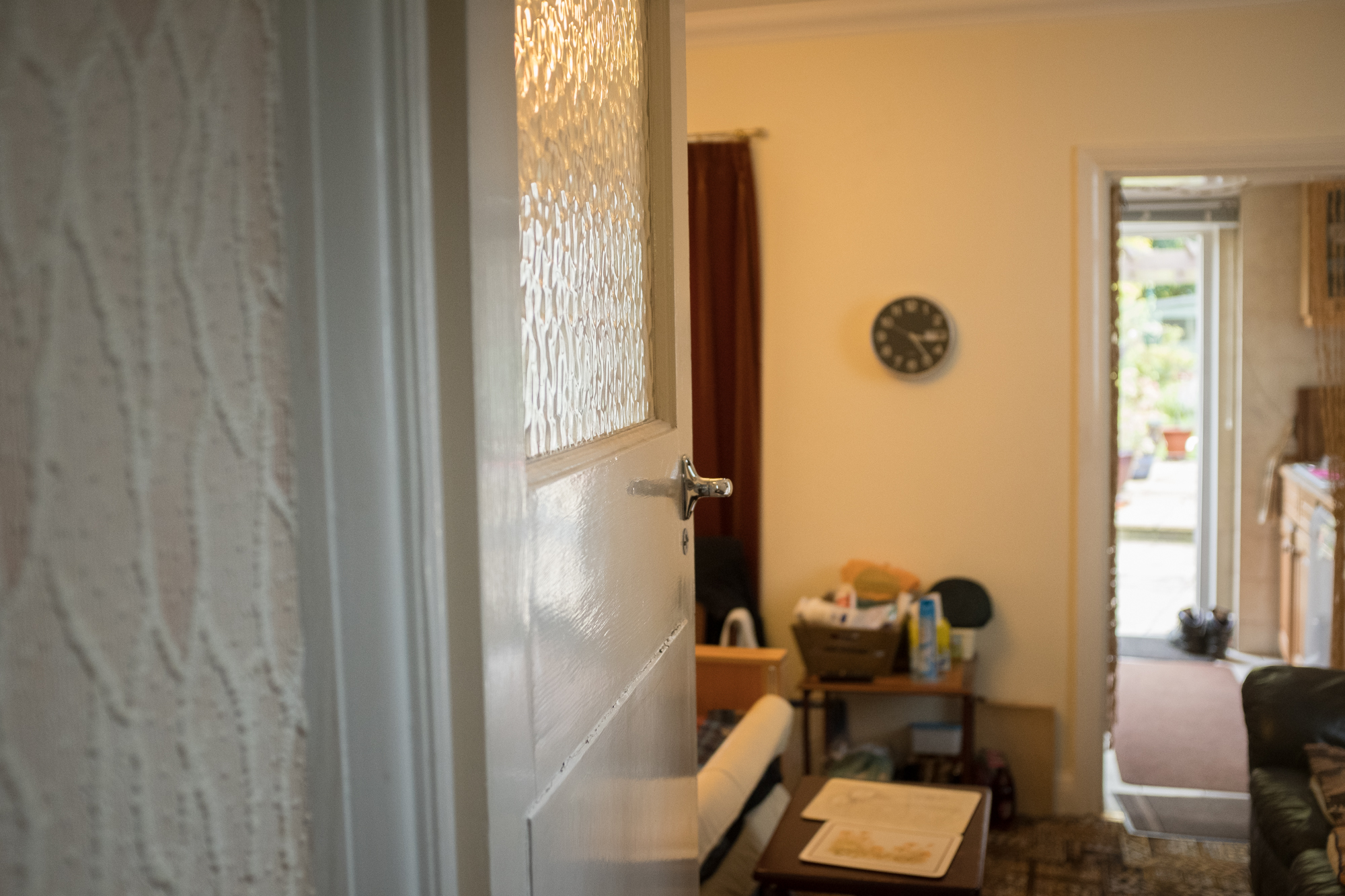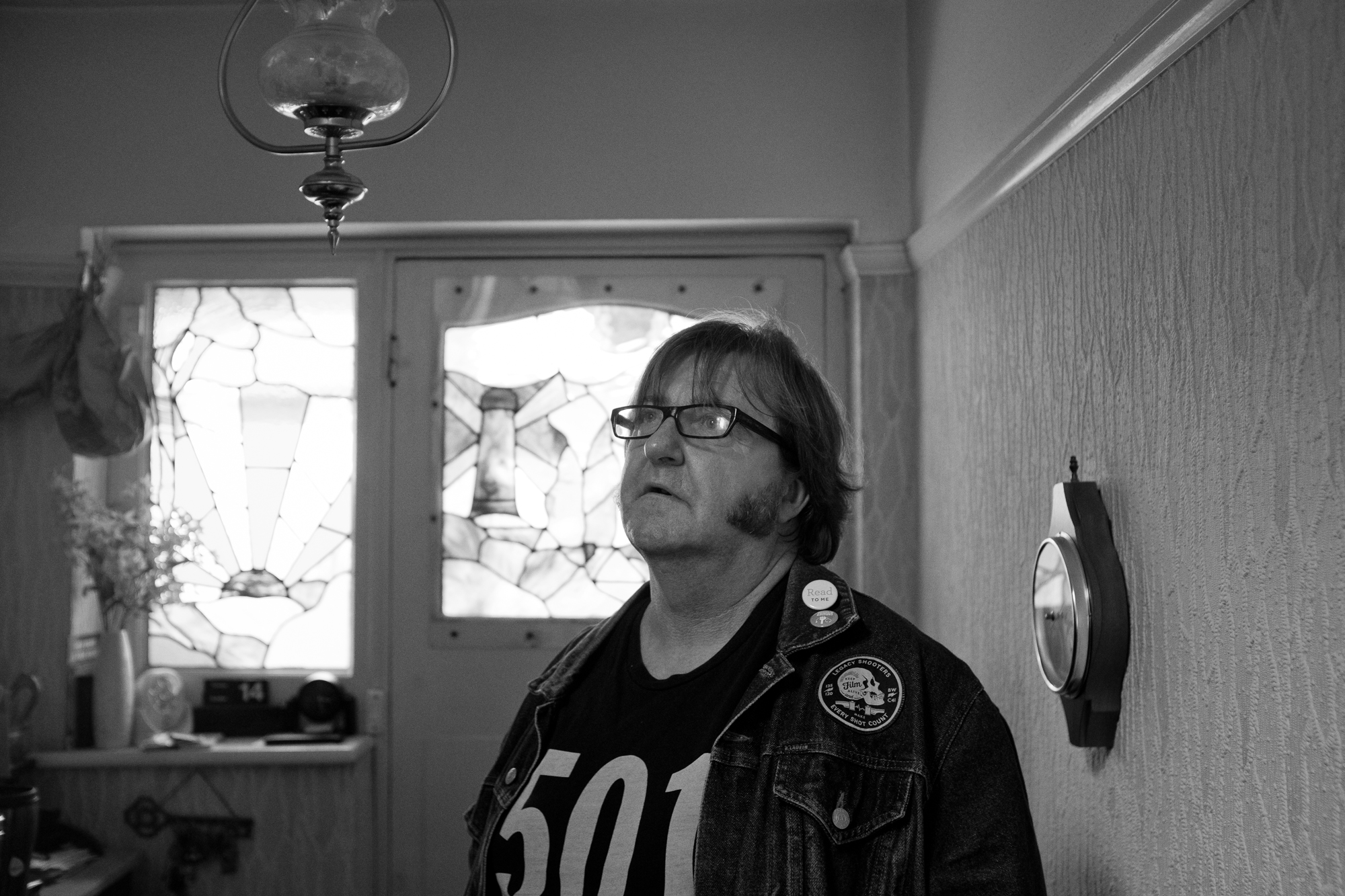Paul & Trevor
Beddington, Surrey
COULD YOU START BY TELLING ME ABOUT THE ORIGINAL PHOTOGRAPH?
My name is Paul Clements,and the photo was taken originally in a road called Bridal Path in Beddington, Surrey. It's of me and my father, Trevor Fenitman, holding me in the garden, and it was taken by my auntie Valerie, who is still alive, and taken on Kodachrome 64, which is a very magical film which I really like. It was such a surprise to come across that photo because it was only found about ten years ago.
Do you know anything about the day that it was taken?
Obviously I don't remember the photo being taken, but because the photo is so lifelike and realistic, it was like it was taken yesterday. So in a way, that memory of the photo being taken has been implanted into my memory and I just appreciate it for the quality, the light. I'm with my dad, holding his finger with my hand, which I still look at and remember the times that my father was holding me and my hand was holding onto his finger, so it's quite evocative and it's a really precious memory because I don't have much left physically of my father at all. I just have a few photos and a watch and that's it really, so it's a very precious photo for me.
Could you describe the context of the photograph?
The setting of the photograph is the back garden of the house that we shared with my grandparents, my mother, my father and me. It was taken in June 1963 on a lovely summers day and it looks so happy and hopeful, looking towards the future and obviously that future didn't work out for us, but it's just a very precious memory. I have a few other memories from my mother, my auntie and a few other relatives of what my father was like. I don't know what his voice sounded like or anything.
"I'm with my dad, holding his finger with my hand, which I still look at and remember the times that my father was holding me and my hand was holding onto his finger, so it's quite evocative and it's a really precious memory because I don't have much left physically of my father at all."
Is it a particularly special place? Is it somewhere you've been back to?
I can't really remember being there at all, but it is a place that's not far away from my home at the moment, so occasionally I have been there, parked the car outside and seen it from the outside, the house where we used to live. I look at things like old buildings that are nearby, trees that would have been there when my father was there and I can sometimes find myself looking at individual features of the houses nearby that have original features, like front doors or original glass panes, just any sort of building materials. I look at them, sometimes touch them, because I know they were there when my father was there.
What was it like going back today?
Going back today was really special, because we approached the present owner of the house and he was obviously a little bit suspicious of us initially, but invited us into the back garden where the original photo was taken. As I was standing against the wall to have my photograph taken, the rear door was open, there was these evocative smells coming from the house as well as music that would have been played in 1963 from Andy Williams and Frank Sinatra. I found it really precious to be there, to stand in the same place that my father stood holding me. It was just so evocative and so lovely. I was looking through the back door at features within the house and I noticed that one of the doors was obviously an original part of the house when it was built in the 1920's or 30', it was a very art deco panelled door with a glass part in it as well. As I was looking in, the man, John, who owns the house now said to me, "You'd like to go in wouldn't you?", and I said, "Yes please" and he said, "Well you can't" and he was obviously just pulling my leg and he invited into the house. It was just something I've always wanted to do and to go into the house itself and be part of it was just like coming home in a way. It was so evocative, as I said with the music and the smells of home cooking. It felt a very safe place to be in, even though it's not my house anymore.
Does it feel important to have that tangible experience, in terms of remembering?
It was a tangible experience. As I get older, and I have my own children now, I know my father lives through me and my children, we have the same genes, but it was a very special experience.
'I found it really precious to be there, to stand in the same place that my father stood holding me. It was just something I've always wanted to do and to go into the house itself and be part of it was just like coming home in a way. It was so evocative, as I said with the music and the smells of home cooking. It felt a very safe place to be in, even though it's not my house anymore."
Could you tell me about your dad, what do you remember of him?
I don't have any memories of being in the house with him at that time. I have dreamed about it in a strange way when I was back in the house for a day and in the garden with my father. The only real memory I have of my father is when we moved to South Africa. We lived in Johannesburg and had a white mini, a car that used to be parked outside the flat that we were in. I came out of the flats running towards my dad and I fell down the steps. I must have been about 2 and a half at the time and I remember looking up, seeing the mini car and my dad picking me up. Because my dad died when he was 28 and I was only just coming up to three years old, I don't have really any other memories of him or what he was like, I just have memories given to me by people that knew him. Everybody's told me how lovely he was, I don't know whether they're saying that to me because he's not here any more.
What was the reason for moving to South Africa?
From that photograph, it's just such a happy family photograph. My aunty took it, my grandparents were there at the time, they all took turns holding me, having a separate picture taken with me. It was taken just before we moved to South Africa, so it would have been that sort of, parting photograph for the parents.
My father was a welder, he worked in Purley, there was a power station there, which is now the Ikea. My father was looking to do the same job but a better paid rate. At the time a lot of other commonwealth countries were encouraging skilled workers to move for work, and so my dad took the opportunity and so we moved to South Africa in the summer, mid 1963. My father settled into his job in Johannesburg, very naively, not really knowing much about what the situation was in South Africa. He soon found out what was happening and became very upset by it. He joined a trade union and got quite upset about the political situation, getting involved with the local politics.
At the end of November 1964 my mother and I came back to England to visit her parents, my grandparents just before Christmas and we were going to stay for Christmas and then go back to Johannesburg in January. Unfortunately my father was killed in Johannesburg in our flat while we were away. The front door was smashed in, some of the furniture was misplaced and broken, there was a cabinet that had the glass broken and my father was unfortunately shot and killed on the premises. The incident was investigated by the South African police force, who unfortunately decided it was a suicide, which was shocking to my mum, her parents and her brothers and sisters couldn't believe what was happening, but were in no position to investigate the situation. Because my father was put down in the post mortem and the death certificate as committing suicide that meant that any monies or insurance was null and void, so we were left practically destitute in London.
For the next few years we moved between people's houses, sleeping on their settees and on spare beds whilst my mum work. I was still young and going to school. There were aunties and uncles who stepped in to pick me up from school, but my mum had about two or three jobs a day, just to keep us going really. It was quite tough, but as a kid I thought it was great as I was playing with all my cousins and moving around different houses, whilst my mum was working, flogging herself on three jobs.
My mother was then fortunate to meet another man who was very very kind and she married him and he became my step-father. From then on I had the best childhood ever, I had adventure playgrounds to play at, Ashdown Forest near Crawley where I lived so I could play in the woods and be completely mischievous as a young boy, it was the days of adventure playgrounds where you could do what you liked! So people would donate crashed cars to the playground, so the first thing we would do would smash all the glass and set fire to the petrol tank, but that seem to be allowed for some bizarre reason in the mid-70's! It was so strange, the reason why that was, was the whole philosophy of adventure playgrounds was, well, people wrote papers about it, the idea was to destroy and break things, do what you like as a young child with no health or safety. We used to set fire to rubber tyres! You'd get this black toxic plume of smoke, it looked like a plane crash from a distance, but after while you actually get bored of doing this and then you start building things. I couldn't believe this, my old english teacher gave me this paper, written by a Swedish philosopher in the 1960's about adventure playgrounds and we ended up building a house! We built this place with a concrete floor, we had cavity insulation walls, we had a turf roof, which must have been the first turf roof in the world, it was about 1975, being very eco-friendly after destroying the o-zone layer with our rubber tyres! What we used to do, I was only about thirteen or fourteen, we also had a three-piece suite and a bed in this adventure playground. It closed at around 7, but we could get under the fence and get back in to our little house which we had locked up. We used to rent it out to courting couples, which was great. They loved it! They used to pay us off in cider! So we would get absolutely smashed whilst they were doing naughty things that we had no understanding of. It was great, so I had the best childhood.
We also went to a comprehensive school, which was fantastic. We had very small A-level groups. I did English, Economics and History, everybody came out with A's or B's cos there was only 6 or 7 of us in each class. From that really bad negative thing that happened with my father in 1964, there was a real positive that came from it. If he was around he'd be so happy to see what my life turned out like, the beautiful children and the lovely wife I now have.
"I think losing my dad has made me very humble and appreciative of life and other people. It's made me a lot more tolerant of people who are in worse situations, so I do tend to be quite kind to other people really, I take them on face value and I don't try to judge people if I can. That's what I try and tell my children as well."
I'm interested to know whether you feel like that experience of losing your dad has defined you in any way in particular?
I think losing my dad has made me very humble and appreciative of life and other people. It's made me a lot more tolerant of people who are in worse situations, so I do tend to be quite kind to other people really, I take them on face value and I don't try to judge people if I can. That's what I try and tell my children as well.
I noticed that even in your driving today, you're a very considerate driver, you let people out! The rest of London is driving around trying to squeeze into every gap bumper to bumper! It's a small sentiment, but it goes a long way.
Yeah, it's mad, I just laugh at them!
Do you have any routines, places, anniversaries that you use to think back and remember your dad?
Oh yeah, on his birthday I'm always thinking about him. Definitely on the day he died. I become a little bit sad on the lead up to the day he died, but on the actual day, I think about him because I love him so much, he's my father, but I think about my children, because they have his genes in and he lives on through them. It's so lovely when my aunty Valerie who's my father's sister, can pick up little mannerisms that they have of his, and they didn't even know him, but they're doing things that he would have done in the same kind of way or saying the same kind of things, which is just a really magical experience when that happens. It's just so lovely to see that.
So holding on to who your dad was through your children? A legacy through which he lives on?
Oh definitely. He really does.
"I become a little bit sad on the lead up to the day he died, but on the actual day, I think about him because I love him so much, he's my father, but I think about my children, because they have his genes in and he lives on through them."
What was it like when I asked you to find a photograph for the project?
That photograph is THE photograph. I have another one framed of my mother and me. My mother's still around, so the one with my father is very precious to me and that is the photo that I chose because it means so much to me. In the photo where I'm holding one of his fingers with my left hand and I can look at my hand think, 'I held my father with this hand on that day'.
What was it like re-taking the photograph?
Re-taking it. Initially I thought I would be a bit upset and a bit sad about it, but I found it made me really happy. I felt so secure and comfortable and I just felt I'd come home, it was just really strange! Those smells and the music being played, it was just like time travelling almost really and it was just really therapeutic, it just felt so good and so happy.
The notion of going back in time came to me as well, walking into that space, the carpets, textured wall paper, the stained glass window, the old clock, a very small kitchen in the back of the house...so it did feel to me like we were walking back in time. The garden didn't feel that way, but going into the house, I was so glad we got to do that.
Yes, it was magical walking into the house. I really wanted to get in there, and I didn't know how far to push it! When John, the present owner asked if I wanted to go in I couldn't believe it. If he hadn't, I probably would have asked him anyway, but I know his wife was very ill, so it was extremely kind of him to let us in there. It was so comforting. Maybe there's something in that, I don't know, that I felt like I was at home, maybe something in my mind that it kicked off, but I felt like I was at home, it was my house, even though it wasn't, it was a really strange experience. Having the original features there as well, knowing that my dad had touched things in there, it was really important. It's just one of the happiest days.
I suppose that notion, the experience of that today, is bought about really because that photograph exists, because if that photograph didn't exist, then that place wouldn't have significance.
Yes, well I wouldn't know where it was or anything.
So in that sense for you, that photograph is extremely formative in terms of your ability to remember your dad and your connection to you dad because of that image. Does that ring true?
Yes, because I don't have anything of my dad's, just an old watch. I have that photograph and I hold onto it dearly, because it's very precious. It's a real connection. That physical connection with that building, that house, it was just unbelievable really.
I can't really imagine for you what it would be like if that photograph didn't exist, if you didn't have that to hold on to?
I would be a lesser person I think, not having that photograph.
So is the lesson there to take more photos of friends and family?
Oh, definitely. Which unfortunately is not happening at the moment because everyone's taking them on their phones and then throwing their phone away.
"Re-taking it. Initially I thought I would be a bit upset and a bit sad about it, but I found it made me really happy. I felt so secure and comfortable and I just felt I'd come home, it was just really strange! It was just like time travelling almost really and it was just really therapeutic, it just felt so good!"
Is there anything else you wanted to add?
Having the privilege of being invited into the house, all I could think about really was my mum. She'll be absolutely delighted to see these photos, especially as some of those original features are there. My aunty Valerie as well. My mum hasn't been back to the house since 1963 and to see that and the photos inside I think's going to be really special. When I was in the house, all I kept thinking about and I actually said was that my mum is going to love this when I show her. I wish she was there today, I wish I'd brought her in, she would have loved it.
Do you talk with your mum a lot about your dad, do you share stories?
Yeah, I do. I'm always asking mum for stories about my dad and what he was like, especially my uncles and aunties who actually met him. They tell me little stories about him, what he got up to and what he was like. How he used to flirt with other girls at parties at stuff like that, because he was really good looking. He was a bit of a devil really in some parts, bless his heart! I'm always talking to my mum about it, especially as my mum is getting old as well, I think it's really important. My children ask me questions as well. Photos are so important. I've got other photos of my father as well. I've only got one other of me with my father but all my other photos of my father when he was younger, I've got. Photos are so important, so important to me for those kind of memories and those kind of connections.
Having those conversations is, for me, I've found that whatever your experience of loss or absence is, photographs are a great point of focus in terms of memory and evoking those sensibilities, but actually talking about it is the most therapeutic thing you can do. Even for you, however many years on, what is it, 52 or 53 years on, it's still something you want to talk about, still good to talk about it, it's still healthy to talk about it. There are no timescales on these things.
Of course not, there are no timescales. I'll remember my dad until the day I die, he'll always be with me and I can't wait to meet him eventually and that's going to be a special day. I love him very much and I miss him a lot and I wish he was here with me now, but he knows I've had a great life and I've got beautiful children, he'd be very proud of that. I always say to my mum, 'What would dad say about Rhys or Dylan, would he love them and be proud of them?', and she just cries and says of course he would, he would absolutely love them to bits and spoil them like all grandparents do away from their parents! That's what grandparents are for, to be naughty to their grandchildren, give them sweets and things they shouldn't eat! So he would've loved to be in that position, to do that, but I know he's with us. As I said, I keep on saying he lives on through me and my children, and that's a real positive from a really bad negative, so that's a really good thing.
